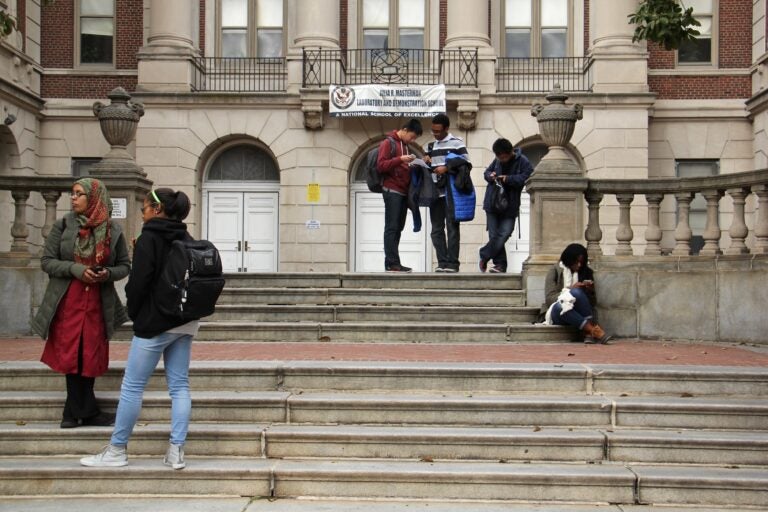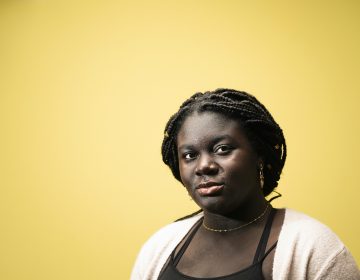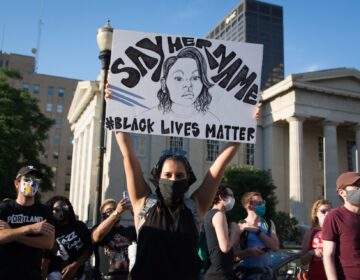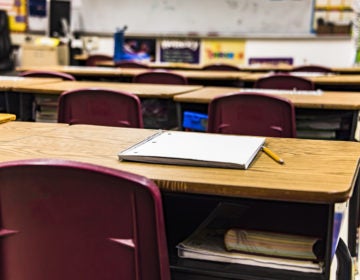Black Masterman students call out racism
"It wasn't really until high school that I started seeing some of the ways in which racism was influencing my own experience."
Listen 16:36
In Philadelphia's high school choice system, selective schools like Julia R. Masterman are the most sought after. (Emma Lee/WHYY, file)
When recent Masterman High School grad Kayla Gibson first saw her white classmates posting about the death of George Floyd on Instagram, she felt supported. “But then, I kind of began to think about it and I’m realizing that all these people all of a sudden are learning about systemic racism, but they aren’t really thinking about how they personally are perpetuating it,” she says.
At a time when Black students at other Philly area schools were anonymously calling out their alma maters on social media, Kayla took different approach: She made a documentary called “16,” featuring 16 stories of racism, stereotyping and microaggressions she and her peers experienced at the selective magnet school where 16% of the students are Black.
The Why spoke to Kayla and to Masterman principal Jessica Brown about what students and the school are doing to address the issues raised in her documentary.

Hear the whole story on The Why
Interview highlights
Kayla Gibson on her experiences of racism at the school
I was constantly labeled as angry. And it’d be funny because I’d make friends, but then a little while in they’d say, “Oh, I thought you were really angry and really mean when I first met you.” It felt like no matter what I did, that was just always going to be people’s initial impression of me and it was really frustrating. And sometimes, I’d have to sit back and really ask myself, like, “Am I mean … am I angry?”
The “angry Black girl” stereotype would sometimes trickle into classwork. Believe it or not, I remember one time I was just, you know, sitting down paying attention to my teacher, and he stopped what he was doing. He was giving us instructions for a project. And he stopped his speech to say that I was giving him a death stare and he didn’t know why. And I thought I was being respectful, you know, paying attention. So there were things like that.
On whether these issues are unique to Masterman
No, I don’t think I don’t think that for a second. Honestly, I know that Central [High School] has been speaking out. Same with Northeast High School about, you know, racist incidents. You start to realize that it’s always going to be everywhere you go.
On what students and alumni organizing around race want to see
I am a part of a group called Masterman Alumni for a Change. And we basically have drafted a charter that is composed of a list of demands for the Masterman administration that would significantly improve the experiences of Black students.
One of the biggest ones is the recruitment and the retention of Black teachers at Masterman. As of right now, only four teachers out of 50 are Black, which is crazy because in Philadelphia, you know, there are just so many Black students. And it’s so important to have the person who’s teaching you, the person who you’re really looking up to, look like you.
Another demand is that a no retaliation policy is established, which will basically ensure that when Black students speak up about these racist incidents that they are experiencing, that there is no way for any teacher or student to retaliate, whether it be through, let’s say, a teacher decides that they’re not going to write you a letter of recommendation for college because you spoke up to them about how you are feeling.
Jessica Brown on how the school is responding
This summer, some of our students have taken the lead and created what they call Dialogue and a Race Forum that we started to at the end of June meet every Tuesday night, and we have dialogue about issues of race. And it’s student-led, so they may create a topic like implicit bias. And so through this dialogue, it’s the start of a way to have more conversations …
I’m still processing [the documentary], to be honest, because it’s awful, it’s horrific. I would never want any child to feel unsafe in a school particularly — it’s like a second home … But I’m committed to you know, making Masterman an anti-racist institution and the staff is as well.
WHYY is your source for fact-based, in-depth journalism and information. As a nonprofit organization, we rely on financial support from readers like you. Please give today.






